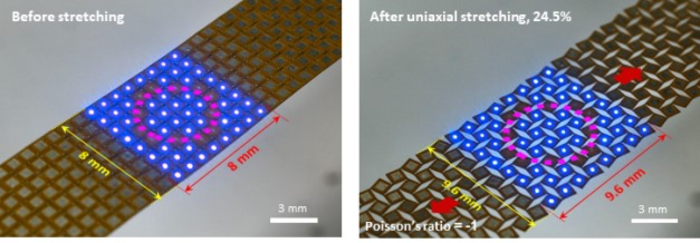For the first time, the Korea Institute of Machinery and Materials (President Sang Jin Park, hereby termed as KIMM), an institute under the Ministry of Science and ICT, has invented a new stretchable meta-display technology that can be extended up to 25% without image degradation.
 When the meta-display is stretched lengthwise, it is also stretched widthwise at the same ratio, so that the displayed image can be expanded without distortion. Image Credit: The Korea Institute of Machinery and Materials (KIMM).
When the meta-display is stretched lengthwise, it is also stretched widthwise at the same ratio, so that the displayed image can be expanded without distortion. Image Credit: The Korea Institute of Machinery and Materials (KIMM).
Dr. Bongkyun Jang, a senior researcher at KIMM’s Department of Nano-Mechanics, and members of his research group have produced a distortion-free stretchable meta-display during uniaxial stretching, and their results were published in the peer-reviewed journal Advanced Functional Materials.
The “Development of Meta-display Technology Based on Micro-LEDs” project, which was conducted in 2019 as part of the Ministry of Science and ICT’s Global Frontier Project, with assistance from the Center for Advanced Meta-Materials (Director Dr. Hak-Joo Lee, hereinafter referred to as CAMM), resulted in this achievement. Since 2008, KIMM’s Department of Nano-Mechanics has been studying micro-LED transfer technology.
The KIMM research team has produced a 3-inch micro-LED meta-display that does not alter the projected picture even though the display is dragged in a certain direction for the first time in the world. This was accomplished through the use of metamaterials that possess distinct mechanical characteristics which do not exist in nature, as well as metamaterial design and production techniques.
When flexible materials in nature, such as rubber, are stretched longitudinally, they typically decrease in breadth, causing picture distortion. To date, this was also true in situations of rubber-based stretchable displays.
On a circuit board, the KIMM research team used mechanical metamaterials with a negative Poisson ratio. When a material is stretched lengthwise, the Poisson’s ratio describes how much it decreases in breadth. Stretching a mechanical metamaterial with a Poisson’s ratio of -1 lengthwise has the same effect as stretching at the same ratio widthwise. As a result, pictures on a display made with such materials are not distorted.
The team combined mechanical metamaterial designs and manufacturing technology with the world’s biggest large-area micro-LED roll transfer technology to create this breakthrough meta-display manufacturing method. The study team wants to do follow-up research on micro-LED displays for ultra-realistic metaverses based on the positive outcomes of this project.
In addition, the team has formed research institution spin-off companies, YTS Micro-Tech and MCK-Tech, to encourage the practical use of these innovative technologies in response to the burgeoning mini-LED and graphene sectors.
Dr. Bongkyun Jang stated that his team has used meta-structures to overcome the critical problem of image distortion in stretchable displays and that he and his group will continue pursuing the commercialization of meta-display technologies such that they can be used in a variety of electronic products in the future.
The recently developed flexible meta-display technology is intended to help diversify platforms for mobile electronic devices like phones and tablets. Such displays may also attach to the skin of a human without wrinkles, enabling applications in various areas of medical equipment, cosmetics and healthcare.
Journal Reference:
Jang, B., et al. (2022) Auxetic Meta-Display: Stretchable Display without Image Distortion. Advanced Functional Materials. doi.org/10.1002/adfm.202113299.
Source: https://www.nst.re.kr/eng/index.do